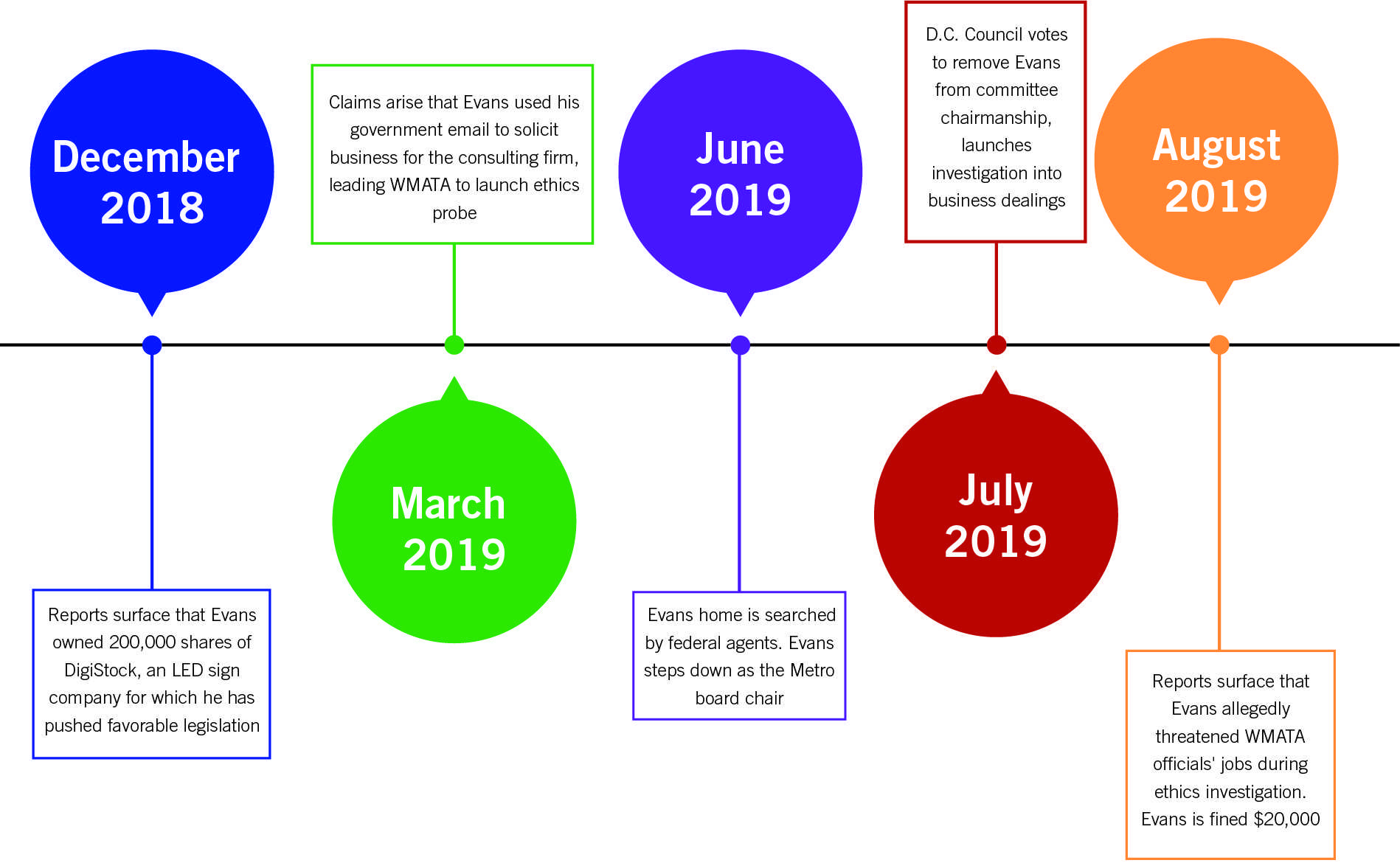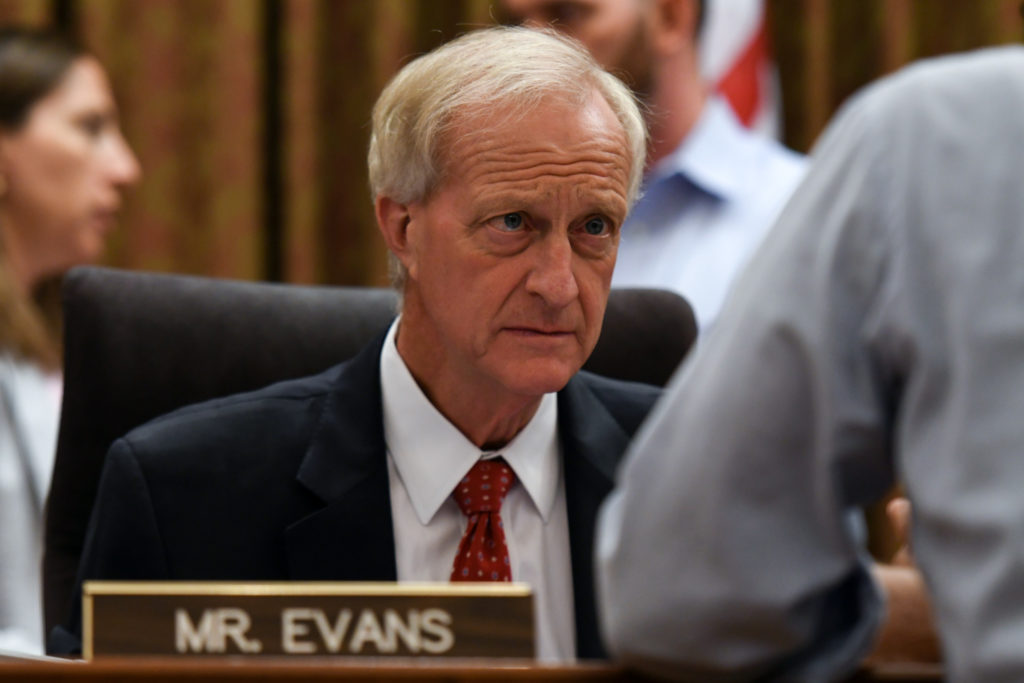In the past 19 months, city and regional ethics boards, federal authorities and the D.C. Council have launched four separate investigations into Ward 2 Councilmember Jack Evans’ private business dealings.
Evans – who has represented 11 Ward 2 neighborhoods, including Foggy Bottom since 1991 – first fell under investigation when the D.C. Board of Ethics and Government Accountability dug into possible connections between his political decisions and private financial interests last January. Five politicians, whose campaigns center around repairing trust between officials and Ward 2 residents, will challenge Evans for his seat next year.

Alyssa Ilaria | Graphics Editor
Evans, who has run unopposed for the Council seat since 2008, declined to comment.
Here is a breakdown of where the investigations into Evans stand:
Conflicts of interest in business
In 2016, Evans helped to found NSE Consulting LLC, a firm that received 200,000 shares of stock from digital sign company Digi Media weeks after D.C. Attorney General Karl Racine sued the company for constructing allegedly unlawful LED signs.
Councilmembers are permitted to hold jobs outside of their Council positions, according to the D.C. Council Code of Conduct. Evans introduced emergency legislation a month after receiving stock to legalize Digi Media’s sign construction.
Evans later withdrew the bill when it failed to receive significant support and has said he returned the stock immediately after receiving the shares.
The D.C. ethics board formally opened an investigation last January to examine Evans’ relationship with Digi Media to determine if Evans made a Council decision to further his own financial interest.
The board’s inquiry was later suspended when federal authorities took over the investigation, during which the FBI raided Evans’ home in Georgetown.
Code of conduct violations
Evans allegedly directed his chief of staff to send emails to two law firms touting Evans’ influence as a councilmember and Metro board chairman to attract potential clients for his private consulting business, the The Washington Post reported in March.
The D.C. Council unanimously voted that month to reprimand Evans for using his political post to secure business deals with law firms lobbying the District. The D.C. ethics board said they found “substantial evidence” that Evans violated the D.C. Code of Conduct and fined Evans $20,000 in a settlement agreement earlier this month.
The controversy sparked an effort among Ward 2 residents to recall Evans, which would remove him from the Council. Ward 2 Citizens Recall, a group leading the effort to unseat Evans, has reached half of the roughly 5,200 signatures needed to permit a recall election, according to the group’s website.
WMATA ethics committee probe
The Washington Metropolitan Area Transit Authority ethics committee commenced an investigation into Evans, who served as WMATA’s board chairman, in March after the D.C. ethics board probe began.
The committee concluded their investigation in May but did not release its findings until June 17, after Virginia Governor Ralph Northam and Maryland Governor Larry Hogan sent a letter requesting that WMATA publicize the results. Local leaders and Virginia state officials also wrote letters to WMATA requesting that the ethics committee release its findings.
The law firm conducting the investigation found that Evans violated multiple Metro ethics codes. But the committee reached a majority concerning Evans’ failure to disclose a $50,000 consulting agreement with Colonial Parking, even though he maintained a close friendship with the company’s chief executive officer, Rusty Lindner.
The law firm found that Evans used his position as chairman for private gain and “placed the best interests” of Colonial Parking and Lindner above the interests of WMATA.
He threatened the jobs of two Metro employees working on the probe and attempted to keep the investigation’s findings under wraps, The Post reported earlier this month.
Evans announced on May 23 – after the investigation’s conclusion – that he would not seek reelection as board chairman. Evans initially said his decision to step down was unrelated to the ethics probe, but a letter detailing the probe’s findings revealed that the committee voted to remove Evans as chair because of his ethics violation.
Two Republican congressmen from North Carolina and Ohio requested records from the investigation, stating that the probe lacked appropriate documentation.
David Horner and Clarence Crawford, who both served on the Metro ethics committee that investigated Evans, received subpoenas on July 9 to testify before a federal grand jury for the U.S. Department of Justice’s criminal probe into Evans.
Backlash from Council
The Council voted the same day to strip Evans of his position as chairman of the Committee on Finance and Revenue and launch its own investigation into Evans. Before the vote, Evans urged his fellow councilmembers to wait for the results of the investigation before removing him as chair.
The results of the Council’s probe are expected to be made public this fall, The Washington Post reported in June.





